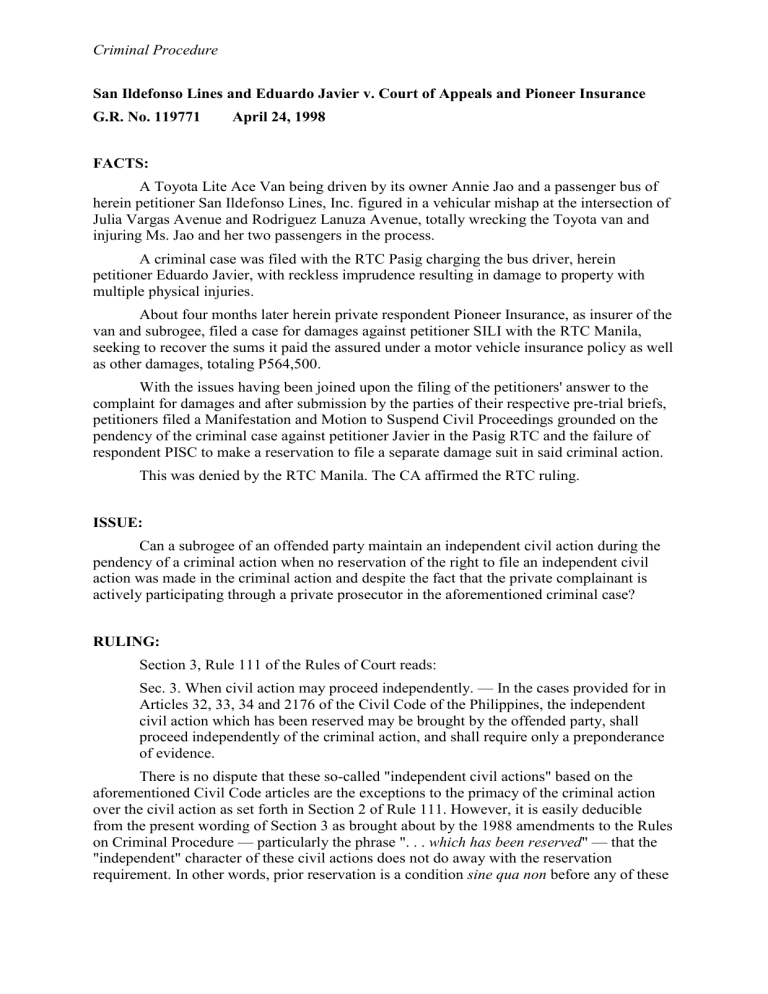San Ildefonso Lines v. Court of Appeals: Civil Action & Criminal Case
advertisement

Criminal Procedure San Ildefonso Lines and Eduardo Javier v. Court of Appeals and Pioneer Insurance G.R. No. 119771 April 24, 1998 FACTS: A Toyota Lite Ace Van being driven by its owner Annie Jao and a passenger bus of herein petitioner San Ildefonso Lines, Inc. figured in a vehicular mishap at the intersection of Julia Vargas Avenue and Rodriguez Lanuza Avenue, totally wrecking the Toyota van and injuring Ms. Jao and her two passengers in the process. A criminal case was filed with the RTC Pasig charging the bus driver, herein petitioner Eduardo Javier, with reckless imprudence resulting in damage to property with multiple physical injuries. About four months later herein private respondent Pioneer Insurance, as insurer of the van and subrogee, filed a case for damages against petitioner SILI with the RTC Manila, seeking to recover the sums it paid the assured under a motor vehicle insurance policy as well as other damages, totaling P564,500. With the issues having been joined upon the filing of the petitioners' answer to the complaint for damages and after submission by the parties of their respective pre-trial briefs, petitioners filed a Manifestation and Motion to Suspend Civil Proceedings grounded on the pendency of the criminal case against petitioner Javier in the Pasig RTC and the failure of respondent PISC to make a reservation to file a separate damage suit in said criminal action. This was denied by the RTC Manila. The CA affirmed the RTC ruling. ISSUE: Can a subrogee of an offended party maintain an independent civil action during the pendency of a criminal action when no reservation of the right to file an independent civil action was made in the criminal action and despite the fact that the private complainant is actively participating through a private prosecutor in the aforementioned criminal case? RULING: Section 3, Rule 111 of the Rules of Court reads: Sec. 3. When civil action may proceed independently. — In the cases provided for in Articles 32, 33, 34 and 2176 of the Civil Code of the Philippines, the independent civil action which has been reserved may be brought by the offended party, shall proceed independently of the criminal action, and shall require only a preponderance of evidence. There is no dispute that these so-called "independent civil actions" based on the aforementioned Civil Code articles are the exceptions to the primacy of the criminal action over the civil action as set forth in Section 2 of Rule 111. However, it is easily deducible from the present wording of Section 3 as brought about by the 1988 amendments to the Rules on Criminal Procedure — particularly the phrase ". . . which has been reserved" — that the "independent" character of these civil actions does not do away with the reservation requirement. In other words, prior reservation is a condition sine qua non before any of these Criminal Procedure independent civil actions can be instituted and thereafter have a continuous determination apart from or simultaneous with the criminal action. Clearly then, private respondent PISC, as subrogee under Article 2207 of the Civil Code, is not exempt from the reservation requirement with respect to its damages suit based on quasi-delict arising from the same act or ommission of petitioner Javier complained of in the criminal case. As private respondent PISC merely stepped into the shoes of Ms. Jao (as owner of the insured Toyota van), then it is bound to observe the procedural requirements which Ms. Jao ought to follow had she herself instituted the civil case.
